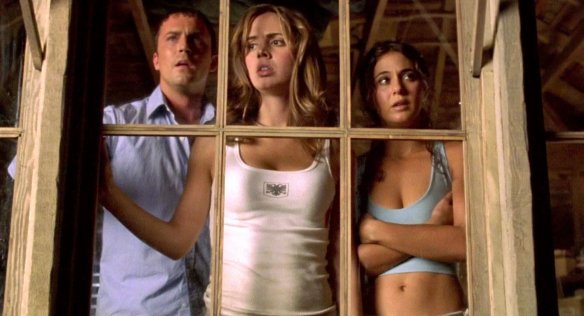Hello folks, and welcome back to Wrong Every Time. The fall anime season is now upon us, which for me means it’s time to look back on the summer season, and see if any of its brave contenders seem worthy of revisiting. I have to admit a certain nostalgia for putting my whole heart into some seasonal contender only for it to flame out spectacularly, but I’m afraid my heart can only take so much disappointment these days, and thus I generally employ the safer strategy of letting the race end and retroactively assessing the wreckage. Of course, all that personal philosophy goes out the window when money enters the equation, and thus I was happy to munch through the first episode of Hiroshi Nagahama’s Uzumaki adaptation for you faithful viewers. I’ll have a full notes article on that out soon, but for now, I present to you ravenous hounds a fresh trencher of film reflections. Let’s get to it!
First up this week was Wrong Turn, the first entry in an impressive run of direct-to-video slashers, all built on the humble, evergreen concept of pitting hapless travelers against a family of cannibal hillbillies. Stranded in the backwoods of West Virginia, six travelers find themselves hunted by a trio of gibbering locals, pursued like wild game as they seek an end to their crowd-pleasing nightmare.
Wrong Turn understands that all you need to sell a slasher is perhaps three or four strong kill ideas, actors who can actually sell their lines, someone who knows how to manage a proper lighting setup, and perhaps one spooky-ass decaying building. Equipped with precisely these resources and basically nothing more, the film proceeds with efficiency and an utter lack of pretension, knowing its marks and hitting them with blunt precision.
The five minutes spent at Texas Chainsaw Massacre’s dinner table have inspired an entire subgenre of imitators ranging from House of 1000 Corpses to Resident Evil VII, and Wrong Turn provides a fine addition to the collection. Additionally, there’s a sequence taking place high in the branches of a moonlit forest that actually felt genuinely novel to me, a rarity given my relentless plundering of horror history. An expertly cooked slice of exactly what you were expecting.
We then continued our journey through the ‘80s OVA Megazone 23 with its second segment. Part two trades the glamorous surface life of Japan’s bubble era for its seedy cyber-underbelly, centering on a group of rebellious bikers our heroes have taken up in the wake of the first segment. The director is also switched out, with Artland founder Noboru Ishiguro’s clean, graceful aesthetic traded in for the manic linework of collaborator Ichiro Itano, who is probably best known as the namesake of the “Itano Circus” animated missile barrage.
Itano’s harshly hatched characters and meticulous approach to mechanical detail fit well for part two’s grimy aesthetic. The segment’s greatest visual feats are undoubtedly its jellyfish-like mechanical monsters, which were basically cribbed wholesale for the design of The Matrix’s sentinels. Here, their tentacles ripple through metal and flesh alike, providing some of the most intricately detailed and flat-out grotesque scenes of destruction I’ve seen in anime.
In contrast with those monsters, the scenes starring our new crew of bikers are actually quite charming, and their quest to Take Back This City rings with earnest, naive sentimentality. This is the sort of story where one boy’s true love can be strong enough to save all mankind from judgment, so it’s advisable to just sit back and enjoy the ride, luxuriating in perhaps the most archetypal realization of sumptuous ‘80s cyberdrama on offer.
Our director changes again for Megazone 23’s third segment, with Itano trading off with frequent mechanical designer Shinji Aramaki. Switched too is the feature’s character designer, a role now covered by Gundam ZZ/Char’s Counterattack designer Hiroyuki Kitazume, who I must confess is not putting in his best work here. Or perhaps it’s simply that I personally possess more fondness for the rounded faces, detailed eyes, and fluffy hair of Megazone’s earlier segments; regardless, this entry feels like a bit of a step down aesthetically, and also more confused narratively than its predecessors.
The story for this one is basically just The Last Starfighter, as our hero Eiji Takanaka parlays his profound arcade dogfighting abilities into a job as a hacker within humanity’s last surviving city. There are shadowy cabals, muted pronouncements of mankind’s downfall, and lots of beautifully animated sequences of Eiji playing Hard On (yes, I know), his arcade game of choice. Those sequences are both the segment highlight and also sort of its fatal flaw; with all of the action relegated to consequence-free videogames, there’s a clear divide here between the narrative and visual action that is never truly resolved. Still, beautifully animated OVAs don’t really have to do that much to justify themselves, and I’ll be sure to check back in for the conclusion of Eiji’s story.
We concluded our week’s screenings with The Lost City, a recent feature starring Sandra Bullock as a romance novelist, and Channing Tatum as the cover model for her gallant, globe-trotting hero Dash McMahon. Bullock is stuck in a professional rut, still grieving the loss of her archeologist husband, and incapable of imagining a brighter future for her barrel-chested protagonist. However, she soon finds herself unwillingly starring in one of her own novels, kidnapped by an eccentric billionaire (Daniel Radcliffe) who’s determined to find the apparently real treasure cataloged in her bodice-rippers.
The Lost City is an action-adventure romantic comedy in a model that’s tragically rare these days, calling back to films like Secret of the Incas, Raiders of the Lost Arc, and Romancing the Stone. “Set a tempestuous would-be couple in a jungle and throw some action setpieces at them” is simply a fantastic movie formula, and The Lost City makes the most of both its jungle setting and phenomenal lead cast. Both Bullock and Tatum are top tier comedic actors, and they are here fitted with a script worthy of their talents, as they constantly trade jabs and engage in goofy physical comedy. Radcliffe is also clearly in his element; he has followed up his Harry Potter era by signing up for only the weirdest, most unhinged roles available, and while his billionaire is a touch more conventional than his roles in Guns Akimbo or Swiss Army Man, he still brings a mix of boyish charm and utter lunacy to the role that pushes it well above the standard villain.
Great cast, great script, great costuming, and all in a genre that’s long overdue for a revival; The Lost City is simply an excellent time, and further proof that Channing Tatum is one of the most funny and flexible leading men in Hollywood, standing as a worthy counterpart to the always-impressive Bullock. Sometimes the greatest of comedic payoffs can arise from the simplest of setups; put Bullock in a sequin pantsuit, ship her off to the jungle, and magic happens.




